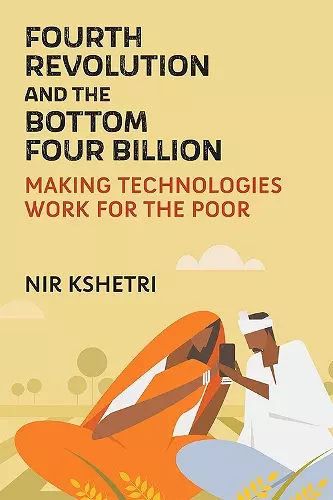The Fourth Revolution and the Bottom Four Billion
Making Technologies Work for the Poor
Format:Hardback
Publisher:The University of Michigan Press
Published:30th Apr '23
Currently unavailable, and unfortunately no date known when it will be back

Products and services based on advanced technologies such as artificial intelligence and blockchain are normally considered to be for rich consumers in advanced countries. Fourth Revolution and the Bottom Four Billion demonstrates how marginalized and vulnerable groups with limited resources can also benefit from these technologies. Nir Kshetri suggests that the falling costs and the increased ease of developing and deploying applications based on these technologies are making them more accessible. He illustrates how key emerging technologies are transforming major industries and application areas such as healthcare and pandemic preparedness, agriculture, finance, banking, and insurance. The book also looks at how these transformations are affecting the lives of low-income people in low- and middle-income countries and highlights the areas needing regulatory attention to adequately protect marginalized and vulnerable groups from the abuse and misuse of these technologies. Kshetri discusses how various barriers such as the lack of data, low resource languages, underdeveloped technology infrastructures, lack of computing power and shortage of skill and talent have hindered the adoption of these technologies among marginalized and vulnerable groups. Fourth Revolution and the Bottom Four Billion suggests that it is the responsibility of diverse stakeholders—governments, NGOs, international development organizations, academic institutions, the private sector, and others—to ensure that marginal groups also benefit from these transformative innovations.
“Empirical evidence agrees that information and communications technologies have not necessarily benefited the world’s least developed economies, and may have perhaps led to greater disparities. In the emerging Fourth Industrial Revolution, how could technologies such as artificial intelligence, blockchain, remote sensing, and the internet of things be applied so that socioeconomic benefits may accrue to all? Professor Nir Kshetri argues that in order to ensure that the bottom half of humanity also benefit from these transformative innovations, stakeholders must come together to provide the regulatory protection and incentive to the marginalized and vulnerable. Having read a preprint of this book, I recommend it to any serious scholar of ‘tech for good.’” —Ravishankar Sharma, Zayed University, Abu Dhabi Dubai
“The ‘Fourth Industrial Revolution’ is empowered by the dizzying advancement of modern emerging technologies, which are often deployed with little forethought about their potential adverse consequences on society at-large, and the poorest and most vulnerable in particular. Professor Kshetri delivers an insightful, timely, and relevant perspective about how to move the Fourth Revolution forward without leaving behind the ‘bottom four billion’ in the developing world." —Stephen Wingreen, University of Canterbury
ISBN: 9780472075898
Dimensions: unknown
Weight: 363g
374 pages